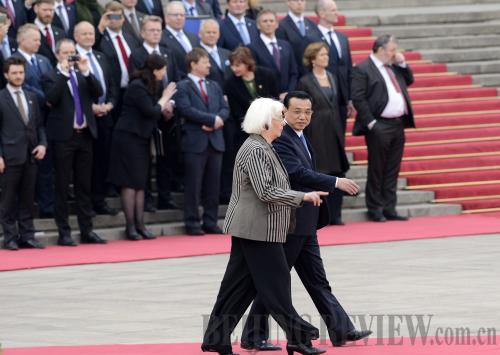|
 |
|
MARCHING ONWARD: Chinese Premier Li Keqiang welcomes Icelandic Prime Minister Johanna Sigurdardottir to Beijing on April 15 (CNSPHOTO) |
Under the witness of Chinese Premier Li Keqiang and visiting Icelandic Prime Minister Johanna Sigurdardottir, China signed a free trade agreement (FTA) with Iceland on April 15. The agreement will not only strengthen bilateral trade and economic cooperation, but it will also encourage more European countries to pursue similar agreements with China to strengthen their business ties.
Both sides thought highly of the agreement. "The China-Iceland FTA is the first between China and a European country," said Li, calling the deal a "milestone." His Icelandic counterpart shared the belief that the agreement will lower prices of Chinese products in Iceland, calling it "a landmark agreement" for both countries. "For Iceland, this is a very important agreement with one of the largest economic powers in the world," Sigurdardottir said.
Iceland clearly has been going through hard times due to the spreading financial crisis. The Icelandic prime minister said she expected the agreement would diversify trade and reduce her country's deficit. China will play an important role in Iceland's recovery from the economic crisis, and the FTA with China will certainly be important for Iceland's economic growth, debt reduction and job market expansion, she added. The two sides also signed agreements on cooperation in fields including finance, geothermal energy and energy saving.
The lingering financial crisis is just one of many reasons for enhanced cooperation. There is a strong mutuality between the Chinese and Icelandic economies, said Wei Liang, a researcher in world economic studies with the China Institutes of Contemporary International Relations.
Wei explained that as a developed European country, Iceland has advantages in aspects such as having a well-established economic system. Moreover, there is great potential for the two countries to strengthen collaboration in practical technology, especially in the geothermal area. Given the fact that the FTA will facilitate bilateral trade and investment, China and Iceland are confident about their future cooperation.
This is an example of how China and Iceland turn challenges presented by the economic crisis into win-win opportunities, Wei said. Iceland hopes to win a chance to strengthen ties with a country outside Europe, while China expects to deepen its engagement with European countries, he added.
China and Iceland have maintained a good relationship in the past decades. Since the establishment of their diplomatic relationship in 1971, bilateral trade and economic cooperation has progressed smoothly. Iceland is the first West European state to recognize China's full market economy status. When Iceland's banking system collapsed following the outbreak of the global financial crisis, China signed with the country a currency swap agreement. In 2012, two-way trade reached more than $180 million, up 21.1 percent year on year. China's exports to Iceland totaled $95.39 million, up 24.6 percent, and its imports from Iceland stood at $88.96 million, up 17.7 percent.
From a long-term perspective, the two sides will benefit in different ways from the FTA. For example, China will provide a wide market for Iceland, while the latter can offer China experience in teaming up with European countries, Wei added.
The FTA with Iceland will be a new step for China in boosting its trade and economic cooperation with Europe. According to Premier Li, the deal will not only commence a new era for the "future-oriented, mutually beneficial and win-win" relationship between China and Iceland, but also set an example for the development of economic ties between China and Europe as a whole.
Under the FTA, Iceland will cancel tariffs on 99.77 percent of all China's exports to Iceland. China, for its part, will give zero-tariff treatment to 81.56 percent of its imports from Iceland.
Currently, China also is holding FTA talks with Switzerland and Norway, which are non-EU countries like Iceland. Wei believes bilateral FTA talks with non-EU countries are more feasible for China, and there is still a long way to go before FTA talks with EU members become possible.
China has previously signed FTAs with ASEAN, Pakistan, Chile, New Zealand, Singapore, Peru and Costa Rica. There are five agreements currently under negotiation.
The FTA with Iceland may prompt other European countries to think about the advantages of holding bilateral FTA negotiations with China, said Cui Hongjian, a researcher in European studies with the China Institute of International Studies.
Email us at: dingying@bjreview.com | 